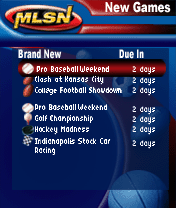Games on Deck got a chance to sit down with Trip Hawkins, CEO of Digital Chocolate on the first day of this year's Game Developer Conference. In this first part of a two part interview, we talk to him about his company, his thoughts on the mobile and console games industries, and the future of digital distribution.

 Trip Hawkins started his career as one of Apple Computer's earliest employees in the Director of Marketing position, and has since gone on to lead a rollercoaster career of ups and downs, from being the founder of Electronic Arts, to the founder of the ill-fated 3DO. With such an illustrious history, it seems only natural that Trip would be the currently the chairman, CEO, and founder of mobile phone games company Digital Chocolate. Games on Deck got a chance to sit down with Trip on the first day of this year's Game Developer Conference. In this first part of a two part interview, we talk to him about his company, his thoughts on the mobile and console games industries, and the future of digital distribution.
Trip Hawkins started his career as one of Apple Computer's earliest employees in the Director of Marketing position, and has since gone on to lead a rollercoaster career of ups and downs, from being the founder of Electronic Arts, to the founder of the ill-fated 3DO. With such an illustrious history, it seems only natural that Trip would be the currently the chairman, CEO, and founder of mobile phone games company Digital Chocolate. Games on Deck got a chance to sit down with Trip on the first day of this year's Game Developer Conference. In this first part of a two part interview, we talk to him about his company, his thoughts on the mobile and console games industries, and the future of digital distribution.
Games On Deck: I personally feel that games are the end result of what happens when the end product of the developer meets with the actions of the player. What are your thoughts on this?
Trip Hawkins: Absolutely. I feel exactly the same way. Clearly a big difference between games and other entertainment media is that it's interactive so suspension of disbelief occurs in all media. You read a book and you have to convert Arabic symbols into imagery in your head and project yourself into that situation and identify with the characters in that story. As human beings we have a tremendous capacity to do just that. But obviously most media are passive and you're cast more into the role of an observer. So what's really neat about games is that you're the principal actor, or at least that's usually the role in which you're cast. Not only is it more exciting because you are there, it's also a lot more dynamic because there are countless decisions that you get to make as the player. You get to be the hero and lots of games have themes of omnipotence of omniscience, so you have to be all powerful and all knowing. It's pretty cool, you know?
GOD: Based on this philosophy how do you look at games?
TH: Of course I've done a lot of different games over the years on different platforms. The way I see mobile... I think the reason people consume media isn't so much about the content it's really more about the social contact they get to have because of it. So if you see a movie or read a book you want to talk to somebody about it. If you're playing a game you're going to have much more fun if you're playing it with someone. So what we're finding especially true with the mobile phone is that people are adopting behaviors besides just making phone calls. They start doing SMS messaging and showing people crummy pictures they took with the camera and, you know, changing their ring tone. It's kind of charming, in a way, to see people tolerating these first generation technologies that are, frankly, low fidelity and somewhat cumbersome. It's not that simple to triple tap a message on your cell phone, yet everyone's doing it.
GOD: Why is it that people are putting up with these things?
TH: I think when these phones first appeared in Japan that a lot of people made the mistake of thinking, "Ohh it's just a Japanese thing, and they're stuck in all these subway cars all the time and they need something to do." The reality is that there are some very fundamental human needs being served, and there are certain things being adopted everywhere around the globe. It really comes back to the social benefit of the platform.
I think there's a lot more excitement for the industry as we go from thinking that we're just entertaining people that are trying to kill time, and we start thinking of the gameplay experience having social value. You know the public just has much, much more demand for that, and you see this being mirrored on the internet. Things like MySpace and Facebook and all the social community activity. Obviously World of Warcraft is reaching an unprecedented audience size for an MMO. Casual web games on the internet are becoming a bigger deal with a bit more of a social dimension there.
So between the internet and mobile you can tell were in the era of social computing. Mobile has a lot going for it as a platform because everybody has one. It's far more prevalent than PCs or consoles. Everybody always has it with them. So if you're looking for social contact it's always available to you.
Of course with mobile it doesn't have to be simultaneous real-time. I mean, admittedly if you and I want to play an MMO together we'll schedule time to do it from our PC on our broadband wire line connection...
GOD: ...through your LiveJournal...
TH: Yeah!
Where mobile fits into the scheme is that: I have a mobile lifestyle. You have a mobile lifestyle. If we're friends I still want to be connected with you, I want to do stuff with you, I want to compete with you, I want to share things with you. But my gameplay session may have to come in five minutes here and ten minutes there, or a half hour there. It's not going to line up perfectly with you. I play mobile games with friends of mine that are several time zones away. It's just yet another factor.
I'll get up, I've got this sports game that I play, and I usually play in the morning when I'm reading the sports page. I know that's not at all when my friend in Boston is playing it. He's busy at work, you know? But I can see what he did the last time he played, and I know he's going to see what I did. I'm thinking of him even while I'm having this separate gaming session.
That happens to be a game about making predictions about what's going on in the sports world.
GOD: Is this like Fantasy Football?
TH: A little bit, but it's much lighter game play than a traditional fantasy sport. It's called MLSN [Mobile League Sports Network] Sports Picks. You can set up a league with your buddies and answer these questions and get little virtual trophies and so on. There's an example of where we could still be messaging each other, or even emailing each other about what's going on in the game and it's creating that same kind of connection you see that men will talk about having achieved with their fantasy league on the internet. It's creating these deep friendships. People need to have vehicles for creating the introductions and the social contact. They're not comfortable just reaching out baldly to strangers.
That's why you see a picture of a train in Japan and you'll see all these people, you know, huddled over their mobile phone. Because they don't want to have a party with all these strangers they're on the train with. They want to be connected with the people they know.
It's a different form of gaming. It's more asynchronous. But it has this potential for an unprecedented scale.

MLSN Sports Picks
GOD: What about the people who are used to gaming without the restraints that come with a mobile platform?
TH: The user who wants to have the most technically advanced, immersive, hardcore game experience: mobile is at the opposite end of that spectrum. But where mobile really shines is in delivering social values, bringing true mass market consumers into the gameplay environment, there's a lot of women that play mobile games. It's clearly capable of reaching a much wider demographic, and a much larger audience.
Even the hardcore gamers find that when they're mobile they still want to play, but then they want to play a more casual game. If you're into a more hardcore console or PC game you know, or you're smart enough to know, you're not going to get that experience on a mobile handset. But you still like to have fun and play and be connected with people when you're mobile.
GOD: Back at E3 last year I got a chance to speak with some people from Nokia. They seemed mostly interested in promoting their purchasing agenda. They give you one large chunk of the game up front then you buy many smaller chunks. What do you think about that kind of marketing?
TH: You know we have a lot of technology issues, I think, in what you can call the infrastructure or the plumbing of the mobile ecosystem. [...] So there's a lot of opportunity for; better technologies, frictionless maneuvering, and helping the users get from point a to point b with less trouble. It's really critical because these are more limited devices. You know, they have small screens, they have only a few buttons, the networks aren't quite as fast or reliable as broadband. So you really want to make that experience as seamless as it can be. There's loads of opportunities, like shooting fish in a barrel, to make it better. And it will get better.
Today [the mobile ecosystem is] a bit like where the internet was during the 9600 baud dial-up modem. Obviously the internet has made dramatic progress since then. I think a few years ago that a lot of people probably thought the internet had reached a point of maturity, and then we had the whole dot com meltdown. But frankly it was after that when services like MySpace and Facebook got developed. So this shows you that there's a lot more opportunity in mobile
The idea that you mentioned has to do with a certain model of consumption and they're spoon feeding you "here's a piece and then we're going to let you have this piece later but pay for it." I think there's opportunity for things like that, but it will take a little bit of time for the public to understand and be trained on those kinds of models, but there's tons of flexibility for different kinds of models.
The essential theme that I really believe in is that... are you familiar with the carrier deck? Do you know what that means?
GOD: Carrier deck?
TH: Yeah, it's a term for the vending machine that's on the handset. On most people's handset there's a little retail store where they can buy mobile content. Everybody likes to complain about it because they don't think it's a very good experience. The industry kinds of waits for customers to show up and go through the store, find something, and buy it. It doesn't happen very often, so it's kind of holding things back.
I think what the industry has to do is break through that by developing more methods of viral discovery and free trial like we have on the internet. We've built some of these technologies, so on your handset you might receive an SMS from me that has a link in it that allows you to get a free demo.

Trip Hawkins at GDC 2007
GOD: So it's shareware all over again?
TH: Yeah, yeah.
And then if you like it you then have the opportunity to purchase it. How you pay for it may vary. You know you may pay for it in chunks, you may be on a digital asset model where all you're paying for is ammunition for your gun, or clothing, or armor for your character...
GD: ... Or horse.
TH: Or horse.
You might be playing for free in the future if it's advertising driven like you have on the internet. So there are all kinds of opportunities, but we have to do more to leverage the way that the current carrier deck works. If the customer can get a free trial on the web or handset--or find out about it through a friend, email, or SMS--when they decide they like it then it has to be tied back to the carrier deck. Then they can take care of the billing and try to make it as simple as possible.
GD: Currently I see a lot of that going on with music delivery. With the Zune from Microsoft, for example, your friend can send you a track which you can then listen to one to three times where it will delete itself. Then the next time you connect the Zune to your computer you'll get prompted to buy that song your friend gave you.
TH: Yeah, that's an example, and even what's happen with devices like the iPod, it's great training for a hundred million people now that are familiar with the idea of doing a download. And also familiar with getting download content onto a mobile device. So consumers are going to become more sophisticated and the technologies are going to get better.
[Matthew Williamson is the creator of The Gamer’s Quarter, an independent videogame magazine focusing on first person writing. His work has been featured on MTV.com, 1up.com, Chatterbox Radio, and the Fatpixels Radio Podcast.]
[This is Part One of a two part interview. Part two is to be published next week.]
Read more about:
FeaturesAbout the Author(s)
You May Also Like








